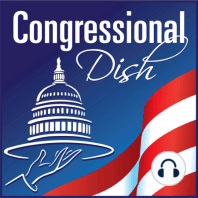56 min listen
CD161: Veterans Choice Program
ratings:
Length:
151 minutes
Released:
Nov 13, 2017
Format:
Podcast episode
Description
The Veterans Health Administration operates a taxpayer-funded health system to provide our nation’s veterans physical and mental health services. The Veterans Choice Program is a fundamental change to that system as it allows veterans to get taxpayer-funded health care in the private sector. In this episode, learn the history of the Veterans Choice Program, discover the changes that Congress and the Trump Administration have made to the program this year, and get some insights into the future of the program. Please Support Congressional Dish Click here to contribute using credit card, debit card, PayPal, or Bitcoin Click here to support Congressional Dish for each episode via Patreon Mail Contributions to: 5753 Hwy 85 North #4576 Crestview, FL 32536 Thank you for supporting truly independent media! Bills H.R. 3230: Veterans Access, Choice, and Accountability Act of 2014 Allows veterans to get medical care outside the Veteran's Administration system; they can go to any health facility that serves Medicare patients, health centers, the Defense Department, and the Indian Health Service. Veterans are only given this option if they'd have to wait over 30 days for an appointment with the Veteran's Administration or if they live 40 miles or further from a Veteran's Administration clinic. If eligible, the veteran will receive a special identification card. How it works: Veteran notifies VA, VA puts Veteran on an electronic waiting list or authorizes their request, VA works out a payment agreement with the health care provider, VA reimburses health care provider but no more than they would for Medicare services. If the veteran gets treated for a problem that was not related to their military service, their health insurance plan will be responsible for payment and the health care provider will be responsible for going after the insurance company for the money. Veterans can not be charged higher co-payments for care at private facilities than they would have been charged at the Veteran's Administration. This program will end in three years. Orders a private-sector review, establishes a fifteen person commission, and creates a technology task force to review VA practices. Wait times for care can not be considered when determining performance bonuses for top officials at the Veteran's administration and performance goals that disincentivize using private health providers for veteran care will be eliminated. Wait times for health care at the VA, VA facility quality measures, and VA doctor credentials will be published online. The VA will add 1,500 graduate medical education residency positions for five years to address staffing shortages. Extends the program that reimburses medical students for education costs and increases the amounts they'll receive for working for the VA. Expands coverage for mental health care related to sexual assaults, which will include veterans on inactive duty. This will be effective August 7, 2015. Extends a pilot program for assisted living care for veterans with traumatic brain injuries until October 2017. Disqualifies public colleges that charge veterans more than State residents from being qualified schools for veteran education benefits. Makes it easier to fire or transfer senior executives at the Department of Veteran's Affairs. Appropriates $15 billion to implement these changes. S. 544: A bill to amend the Veterans Access, Choice, and Accountability Act of 2014 to modify the termination date for the Veterans Choice Program, and for other purposes Eliminates the end date for the Choice Program, which was supposed to expire when the money ran out of after three years. Changes the payment system from one where the veteran's health insurance plan must pay for non-service related treatments, with doctors getting reimbursed directly from the insurance companies to a new system where the Veterans Department will pay and be reimbursed by the insurance companies. Establishes
Released:
Nov 13, 2017
Format:
Podcast episode
Titles in the series (100)
CD005: Lame Ducks Return: During another slow week in Congress, Jesse Jackson Jr. resigns, Nydia Velazquez (NY) ignores a subpoena, the Department of Homeland Security gets investigated, the Senate fights about filibusters, and the Trans-Pacific-Partnership is confirmed as... by Congressional Dish
